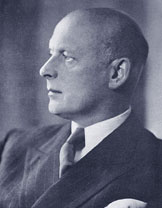As the latest research shows, in the "Night of Broken Glass", attackers destroyed well over 1000 synagogues in Germany and more than 7500 businesses. About 400 Jews were murdered by the Nazis or committed suicide in the wake of the pogrom. Over 30,000 Jewish citizens were arrested and transported to concentration camps.
70 years ago: Night of Broken Glass
The results of the violence
The night of pogrom was a major step down the path toward completely excluding the Jewish populace from German society.

Discrimination in legal form
The pogrom was followed by laws and regulations that advanced the process of confiscating the property of Jewish citizens, accelerated their emigration and further excluded them from Germany society.
These laws and regulations were the result of a conference called by Hermann Göring, who, as Plenipotentiary of the Four Year Plan, had ultimate responsibility for the National Socialists' economic program. The conference was held on November 12, 1938, at the Reich Air Ministry in Berlin.
The meeting at the Ministry for Air Transport
At this meeting on November 12, 1938, Göring led a discussion of the consequences of the pogroms. In attendance were about 100 representatives of ministerial offices and security services, police and party units of the NSDAP along with a number of representatives of the business world.
The concrete results of the conference were the following measures:
- Under the pretext of compensation for the murder of the diplomat Ernst vom Rath – which had already been misused as a reason for the night of the pogrom itself – the entire Jewish populace was assessed a "fine of atonement", a collective fine of one billion Reichsmarks to be paid to the state.
- Based on the "Decree for the Restoration of the Appearance of Streets", also decreed by Göring on November 12, 1938, the Reich confiscated any and all existing property insurance claims on the part of German Jews (fire, glass and jewelry insurance).
What did that mean for the Jewish insurees?
Following the meeting, Nazi government offices proceeded to issue a large number of discriminating ordinances that robbed the Jewish community of common, fundamental rights and freedoms. This included banning Jews from attending universities, revocation of their drivers' licenses and the forcible sale of their cars as well as the dissolution of Jewish organizations. The insurees were affected by the guidelines used for insurance claim settlements:
- All claims made by non-Jewish parties and Jewish insurees with foreign citizenship had to be settled out of deference to international obligations.
- All claims filed by Jews with German citizenship were, in accordance with a ministerial decree, not to be paid to the insured party, but rather were confiscated by the state.
Allianz board member Eduard Hilgard took part in the meeting as head of the "Reichsgruppe Insurance", the organization forcibly created by the Nazi regime to represent the interests of the insurance industry within the Nazi economic system. As the highest ranking representative of the private insurance industry, he was asked to participate in that part of the conference that dealt with questions of insurance liability for the material damages caused by the pogroms. In the end, the insurance industry was obligated to pay to the state a lump sum of 1.3 million Reichsmarks for the claims of the German Jews who suffered the damages.
Allianz' commitment today
These facts are the abstract reflection of many human fates. In 1997 Allianz commissioned the well-known economic historian Prof. Gerald D. Feldman to research the complex background behind them. In 2001 he published his study, "Allianz and the German Insurance Business, 1933-1945." In this nearly 800-page work, he clearly presents the background and the main persons involved in the November Pogroms and the state confiscation and expropriation of insurance claims.
Allianz was also a founding member of the International Commission on Holocaust Era Insurance Claims (ICHEIC), which was created in 1998, and one of the founding members of the "Stiftungsinitiative der deutschen Wirtschaft" (German Economy Foundation Initiative). The latter organization contributed half of the start-up capital of the foundation "Erinnerung, Verantwortung und Zukunft" (Remembrance, Responsibility and the Future). That body, the ICHEIC and the GDV, the German Insurance Association, cooperated in compensating – despite the existence of comprehensive compensation programs after World War II – unpaid or confiscated and previously not compensated insurance policies. The foundation was charged with ensuring that the victims of Nazi exploitation and persecution received restitution and that still-unresolved questions of ownership of financial assets resulting from the Holocaust and slave labor were clarified.
Following completion of payments to former slave laborers and victims of other injustices during the years of the National Socialist regime, it is now the foundation's mission to support projects that further understanding among nations, the interests of survivors of the Nazi regime, youth exchange projects and social justice, that remind people of the threats posed by totalitarian systems and tyranny, and that support international cooperation in humanitarian fields.
As with all content published on this site, these statements are subject to our Forward Looking Statement disclaimer.
Link to the disclaimer